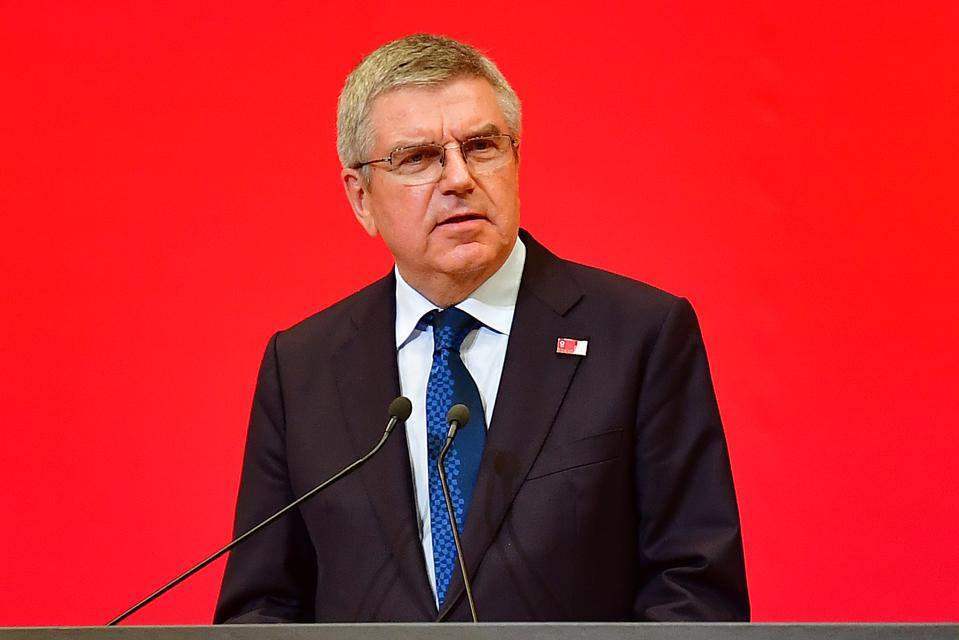In an op-ed that ran on The Guardian’s website Friday, International Olympic Committee (IOC) President Thomas Bach penned his thoughts on politics and the Olympic Games and why, in his opinion, the two don’t mix.
“The Olympic Games are not about politics. The International Olympic Committee, as a civil non-governmental organisation, is strictly politically neutral at all times,” Bach wrote.
Rule 50 of the Olympic Charter bans any form of political protest during the Games. As the IOC Athletes’ Commission expressly stated in guidelines released in January, that would include gestures like kneeling and raising a fist, as well as displaying political messaging like signs or armbands.
But given the growth of the Black Lives Matter movement and a shift in social justice consciousness around the globe, largely through demonstrations, many feel that to punish anti-racist speech at the Tokyo Olympics next summer would ring hollow.
In September, Casey Wasserman, chairman of LA2028, was among those to suggest a change to Rule 50. “I don’t believe anti-racist speech is political speech,” Wasserman said. “I believe it is a political standard we all need to be operating on.”
A group of U.S. athletes led by John Carlos, the sprinter who famously raised a fist on the podium at the 1968 Olympics, has been discussing social and racial injustice as it relates to the Games, including Rule 50 specifically. They released a statement in June calling for the abolishment of the rule.
“While the rule probably exists for a reason, the times are different and, I think, [the rule] requires adjusting, which allows for anti-racist speech within the Olympic and Paralympic platform,” Wasserman said.
World Athletics chief Sebastian Coe also said this month he believes Olympic athletes’ right to make gestures of political protest at the Games should be protected.
In his op-ed, however, Bach reinforced his stance that the Games should remain politically neutral.
“The athletes personify the values of excellence, solidarity and peace. They express this inclusiveness and mutual respect also by being politically neutral on the field of play and during the ceremonies,” Bach wrote. “At times, this focus on sport needs to be reconciled with the freedom of speech that all athletes also enjoy at the Olympic Games. This is the reason there are rules for the field of play and the ceremonies protecting this spirit of sport.
“The unifying power of the Games can only unfold if everyone shows respect for and solidarity to one another. Otherwise, the Games will descend into a marketplace of demonstrations of all kinds, dividing and not uniting the world.”
Bach referenced the decision by several countries to boycott the 1980 Moscow Games to illustrate what he believes is the “political impotence” of sport. Bach, who won team fencing gold at the Montreal 1976 Games, was chair of the West German athletes’ commission at the time and contends the boycott punished the athletes “for something we had nothing to do with—the invasion of Afghanistan by the Soviet army.”
However, many athletes, like those in the USOPC Athletes’ Advisory Council who released the statement calling for the abolishment of Rule 50, denounce the IOC’s position as silencing athlete expression.
It has been 52 years since U.S. sprinters Tommie Smith and John Carlos raised a fist at the 1968 Mexico City Games to protest racial injustice, for which they were expelled from the Games.
In July, Caribbean National Olympic Committees (CANOC) President Brian Lewis called for the IOC to reinstate Vince Matthews and Wayne Collett, who were were expelled from the 1972 Munich Games and banned for life after protesting racial injustice in the United States in a podium protest.
Lewis called Rule 50 a “symptom of systemic racism and racial discrimination.”
On Monday, Bach received the prestigious Seoul Peace Prize, established in 1990 to “crystallize the wishes of the Korean people for peace in the Korean peninsula and the rest of the world.” The nominating group, the Seoul Peace Prize Cultural Foundation, consists of 500 Korean nationals and 800 internationals.
In his acceptance speech, Bach said, “The purpose of the Olympic Games was always to promote peace through sport,” but “like other peace movements, the Olympic Movement has sometimes fallen short.”
Bach reinforced some of his points from Friday’s op-ed as he accepted the Seoul Peace Prize Monday.
“We know very well that sport alone cannot create peace,” he said. “We cannot take decisions on war and peace. This is the realm of politics and not of sport.”
The Seoul Peace Prize awardee receives a diploma, a plaque and USD $200,000. Bach plans to donate the monetary prize to the Olympic Refuge Foundation and three other social charities.
Former Seoul Peace Prize recipients include Kofi Annan, former Secretary General of the United Nations; Václav Havel, former Czech President; Médecins Sans Frontières (MSF); German Chancellor Angela Merkel and Ban Ki-moon, former Secretary General of the United Nations.

